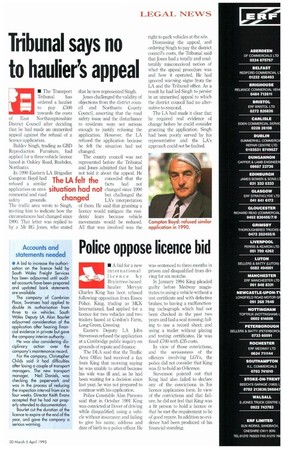Police oppose licence bid
Page 17

If you've noticed an error in this article please click here to report it so we can fix it.
• A bid for a new international licence by Braintree-based haulier Mervyn Charles King has been refused following opposition from Essex Police. King, trading as MCK International, had applied for a licence for two vehicles and two trailers based at Cordon's Farm, Long Green, Cressing.
Eastern Deputy LA John Stevenson refused the application at a Cambridge public inquiry on grounds of repute and finance.
The DLA said that the Traffic Area Office had received a fax from King that morning saying he was unable to attend because his wife was ill and, as he had been waiting for a decision since last year, he was not prepared to continue with his application.
Police Constable Alan Parsons said that in October 1991 King was convicted at Dover of driving while disqualified; using a vehicle without insurance; and failing to give his name, address and date of birth to a police officer. He
a
was sentenced to three months in prison and disqualified from driving for six months.
In January 1994 King pleaded guilty before Medway magistrates to using a vehicle without a test certificate and with defective brakes; to having a malfunctioning tachograph which had not been checked in the past two years and had a seal missing; failing to use a record sheet and using a trailer without plating and testing certificates. He was fined £760 with E35 costs.
In view of those convictions, and the seriousness of the offences involving IAA's, the police did not consider that King was fit to hold an 0-licence.
Stevenson pointed out that King had also failed to declare any of the convictions in his licence application form. In view of the convictions and that failure, he did not feel that King was a fit person to hold a licence or that he met the requirement to be of good repute. In addition no evidence had been produced of his financial standing
































































































